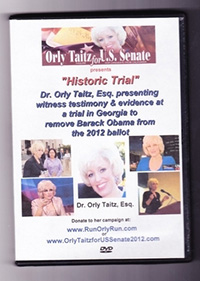The leading immigration court case on President Obama’s deportation amnesty has turned into a wild affair — including a Florida goat farmer who insists that cracking down on immigration would be bad for his business because native-born white Americans just don’t buy goats.
In his brief filed with federal Judge Andrew S. Hanen in Brownsville, Texas, Mitchell Williams accuses Republicans of being neo-Nazis, proposes sticking tea party adherents on Indian-like reservations, and says his goat business depends on foreigners who “are much more likely to want to buy a goat for special occasions or feasts than long resident Americans.”
Mr. Williams is one of the more colorful figures to weigh in, but he is by no means the only one to join the showdown, which touches on hefty constitutional issues concerning presidential powers. A ruling could be announced as early as this week and is likely to be issued before Mr. Obama’s policy goes into effect Feb. 18.
SEE ALSO: John Boehner suggests only courts can stop Obama amnesty, considers House lawsuit
Big-city mayors, led by New York’s Bill de Blasio, have filed briefs arguing for the amnesty because it will pump millions of dollars into their economies. Major labor unions looking for newly legalized workers as potential members backed the amnesty. Sheriff Joe Arpaio from Maricopa County, Arizona, whose challenge to the amnesty was denied in another federal court in Washington, filed friend-of-the-court briefs hoping for a better result in Texas. Three female illegal immigrants, identified only as Jane Does 1, 2 and 3, have asked to be allowed to intervene and add their voices to the official defense of the policy.
Mr. Obama’s defenders sounded confident that his policy would be upheld last year, but some now seem resigned to defeat — at least in the first round in Judge Hanen’s court.
“Next week, we anticipate a preliminary ruling in the case and we expect Judge Hanen to rule in favor of the plaintiffs,” said Marshall Fitz, vice president of immigration policy at the Center for American Progress, who accused Texas of court-shopping to get a biased judge. “While we hold out hope that legal reasoning will prevail over the judge’s personal bias, no one will be surprised by a preliminary ruling for the plaintiffs.”
Much of the fight in the courtroom isn’t even about the law. The big-city mayors and a handful of Democrat-led governors filed briefs arguing that the amnesty policy would be good for police, good for economics and good for the illegal immigrants.
“They’re trying to make the appearance of what will happen if this judge rules a certain way. It’s almost preemptively criticizing the judge’s ruling,” said Josh Blackman, an assistant professor of law at the South Texas College of Law, who has filed his own friend-of-the-court brief in the case arguing that Mr. Obama overstepped his powers. “I think that there’s a strong effort to preemptively delegitimize this ruling.”
Mr. Blackman has written extensively on Mr. Obama’s use of powers but said he was surprised at how little scholarly debate there has been in the months since. Indeed, even as politicians, law enforcement officers and illegal immigrants weigh in on the Texas case, there has been “an awkward silence” from the academy, Mr. Blackman said.
“I’ve just gotten this weird silence from all sides,” he said.
The case turns on two key factors: whether Texas and two dozen other states challenging the president can show they have been damaged by the amnesty, and thus have standing to sue, and if they do have standing, then whether Mr. Obama’s policy goes beyond his duty to carry out the law and treads into Congress’ powers to write the laws.
Late Friday, Obama administration attorneys filed their final reply brief in the case, arguing that Texas and other states don’t have standing because they can’t prove previous amnesties have increased illegal immigration and can’t show any economic harm that wouldn’t happen regardless of whether the illegal immigrants remained in the U.S. without amnesty.
Texas has argued that under Mr. Obama’s policy, those approved for the deportation amnesty will receive work permits that make them eligible for driver’s licenses. For Texas, the cost is more than $100 per permit — a harm that should at least earn the state a day in court to make its argument.
While Texas and the Obama administration duke it out over the law, a number of others have tried to get the courts to focus on other issues.
Orly Taitz, a lawyer who has previously filed lawsuits arguing that Mr. Obama wasn’t born in the U.S., also asked to be part of the Texas immigration case. She had filed a separate challenge to Mr. Obama’s immigration policies, arguing that she caught a disease because of lax enforcement. She also asked Judge Hanen to consolidate the cases, arguing that she was representing average taxpayers whose voices deserved to be heard in the new case.












 29839 Sta Margarita Pkwy,
29839 Sta Margarita Pkwy, 
 Videography by Barbara Rosenfeld
Videography by Barbara Rosenfeld 

